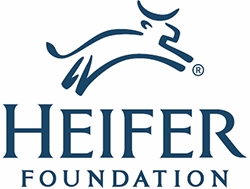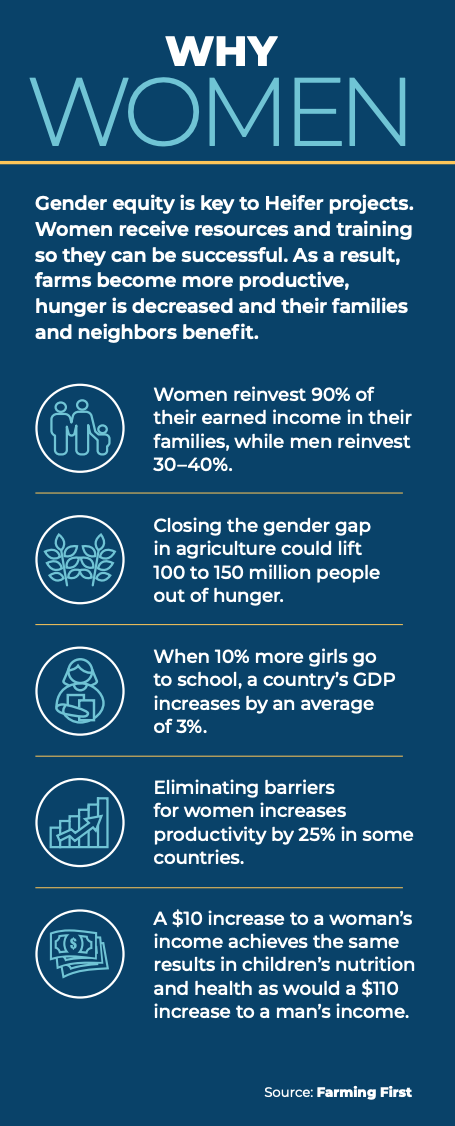MARCH 2022
HEIFER FOUNDATION
NEWSLETTER
What’s Inside
A Letter from Ardyth
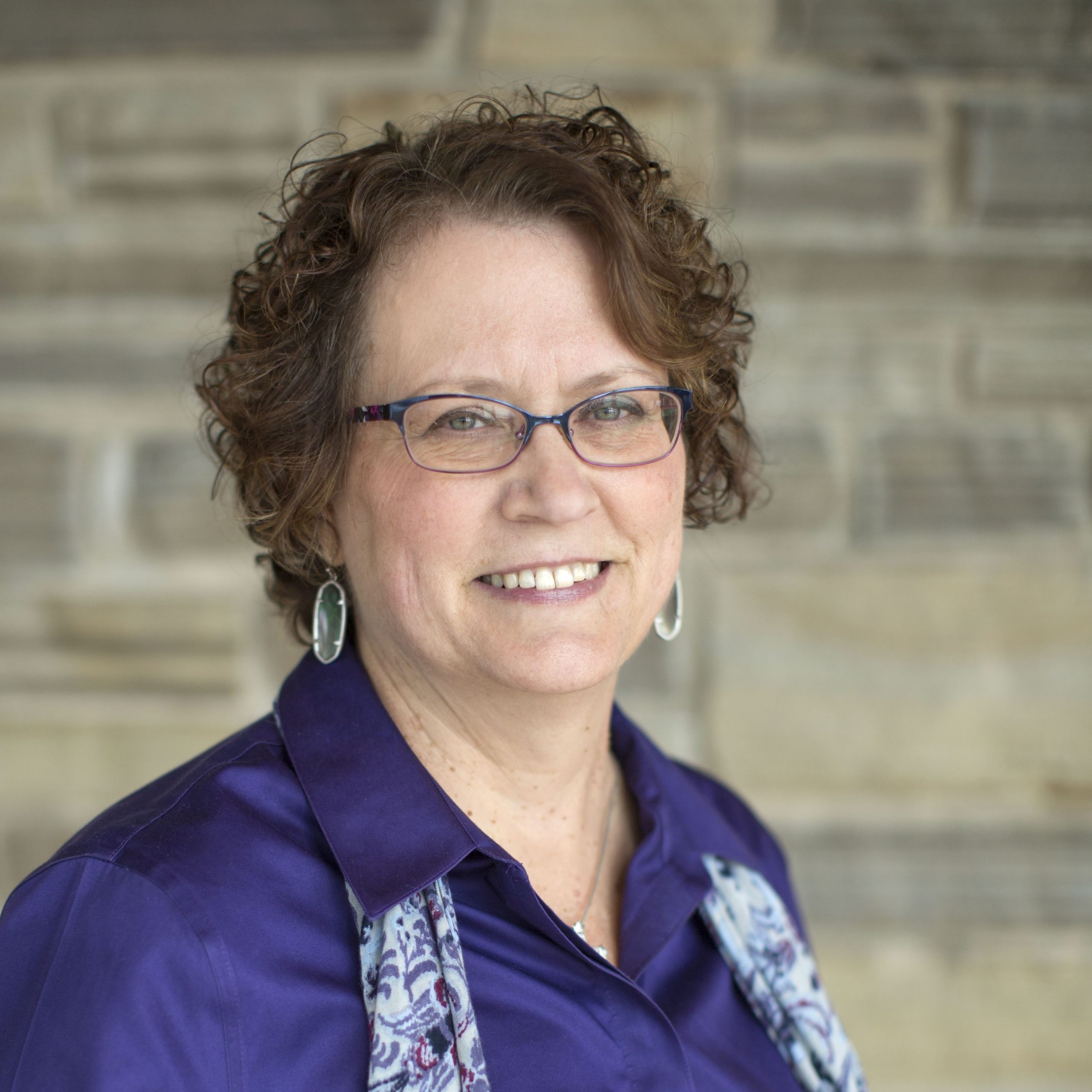 DEAR FRIENDS, I cannot express how happy I am that spring is finally here! March brings warmer days, blooming flowers, the chance for me to get back in my garden — and it also shines a light on women with International Women’s Day and Women’s History Month. It’s the perfect time to acknowledge the extraordinary accomplishments of women around the world!
DEAR FRIENDS, I cannot express how happy I am that spring is finally here! March brings warmer days, blooming flowers, the chance for me to get back in my garden — and it also shines a light on women with International Women’s Day and Women’s History Month. It’s the perfect time to acknowledge the extraordinary accomplishments of women around the world!
Women have truly helped shape Heifer’s past and future — women leaders in our projects, women staff members, women donors who have given generously for decades or left Heifer in their will. Many of our donors fall into what the press has labeled as the “Silent Generation.”
The Silent Generation refers to people born from the late 1920s until the early to mid-1940s, putting them now in their late 70s, 80s and 90s. The generation is sandwiched between the Greatest Generation (or GI Generation) — the heroes of World War II, and the Baby Boomers — who came of age during the Vietnam War. Their “silence” is often attributed to the hard times in which they were born, where they were brought up to be “seen but not heard.”
And yet, I’ve personally always found the term to be an oxymoron — as this generous generation seems anything but silent. I don’t see silence — I see creators, and rebels, and artists, and policymakers. This generation is filled with many not-so-silent people who dared to speak up and fundamentally change our society — in ways that are still apparent today.
I’ve asked some of my colleagues to share which women in the Silent Generation inspire them the most, and I’ve also included stories and quotes of women in Heifer projects. I hope you enjoy their stories and that you take the time to acknowledge and appreciate the sacrifice these women have made — especially during a time when speaking up was not the norm.
Yours For a Better World,
Ardyth Neill
THE
NOT-SO-SILENT
GENERATION

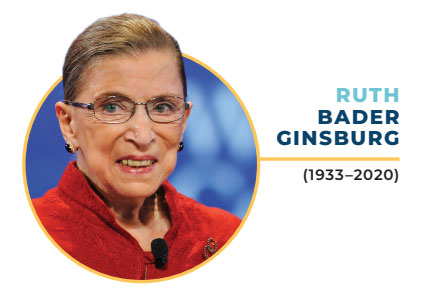
I must confess, I am something of a Ruth Bader Ginsburg groupie. My favorite law professor introduced me to her, and Ruth is indeed a legal, cultural and feminist icon. The movie “Notorious RBG” and Saturday Night Live skits about her fully solidified her image as an unlikely pop star to women spanning across this country and throughout generations.
Read More
Ruth served 27 years on the U.S. Supreme Court. In 1993, then President Bill Clinton nominated her to the position — as the second woman ever appointed. But breaking barriers for women didn’t start at the Supreme Court. For more than a decade, until her first judicial appointment in 1980 (when then President Jimmy Carter named Ginsburg to the U.S. Court of Appeals for the District of Columbia Circuit), she led the fight in the courts for gender equality as director of the Women’s Rights Project of the American Civil Liberties Union. She successfully argued six landmark cases before the Supreme Court.
In 1971, she wrote her first Supreme Court brief in the case of Reed v. Reed. Ruth represented Sally Reed, who wanted to be the executor of her son’s estate instead of her ex-husband. The constitutional issue was whether a state could automatically prefer men over women as executors of estates. The Supreme Court’s answer: no. It was the first time the court struck down a state law because it discriminated based on gender. As an estate planning attorney, this case resonated with me.
Once on the Supreme Court, Ruth continued to defy stereotypes. Although soft spoken, and appearing small and frail in her later years, Ruth was a woman with steely resolve and amazing intelligence. Though a liberal, she and the court’s conservative icon, Antonin Scalia, who died in 2016, were the closest of friends. Rest in peace, Ruth.
DEBBIE MCCULLOUGH
Heifer Foundation Vice President
of Planned Giving
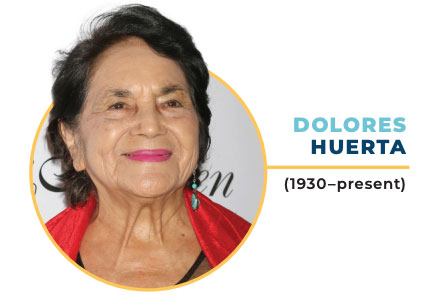
While Heifer has worked for more than 75 years to bring farmers to a living income, Dolores Huerta has worked nearly as many years to improve the lives of women and farm workers in the United States. Now 91 years old, she continues to fight tirelessly for a better world for all…
Read More
despite sexism, racial discrimination and even acts of violence against her. Having run voter registration drives during my time in Arkansas, I’ve discovered just how difficult it can be to pull people together to work toward a common goal, and I look to Dolores’ lifetime of such achievements in awe.
Born in New Mexico in 1930, Dolores is the daughter of farm workers and union miners and the granddaughter of Mexican migrants to the U.S. In college, Dolores earned her teaching degree. Advocating for low-income students soon led her to take on a leadership role with the Stockton Community Service Organization, where she established voter registration drives and worked to improve farm worker communities.
In 1962, Dolores co-founded the National Farm Workers Association, which lobbied for and secured labor rights and disability insurance for farm workers and their families in California. Over the following decades, Dolores worked for the rights of those growing the nation’s food, often facing gender discrimination both in the halls of legislature and within the farm worker movement itself. She became an outspoken advocate of women’s rights and joined the Feminist Majority Foundation to encourage Latina women to run for office.
In 2002, at age 72, Dolores founded the Dolores Huerta Foundation to foster civic engagement, policy advocacy and youth development. She received the Presidential Medal of Freedom in 2012, at age 82. Ten years later, Dolores continues to be an outspoken voice for a better world. Sí, se puede.
DEVIN FOSTER
Heifer Foundation
Planned Giving Manager – West
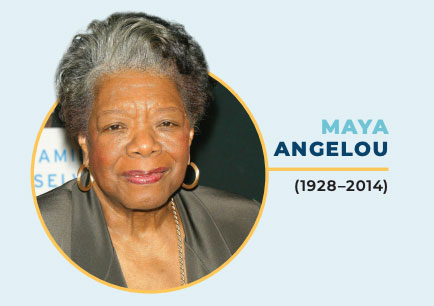
Maya Angelou once said, “My mission in life is not merely to survive, but to thrive; and to do so with some passion, some compassion, some humor and some style.” Maya lived out her mission. Not only was she a poet, singer, scholar and a world-famous author, but she was also a women’s rights activist, especially for women of color.
Read More
During her life, she redefined being a woman in a society that diminishes and ignores their rights and accomplishments.
Maya joined the civil rights movement as a coordinator of the prominent African American organization, the Southern Christian Leadership Conference. She also gave a voice to topics that are culturally forced into silence. Maya’s “I Know Why the Cage Bird Sings,” an autobiography detailing her childhood of sexual abuse, trauma and racism, is widely credited with giving women survivors the courage to tell their stories.
Though with vastly different circumstances, Angelou and I both became single mothers in our lives. Her advice to mothers was to ensure your children receive education, encourage them to be self-reliant and give them self-respect — which I believe to be the cornerstones of a fulfilling existence.
Maya was also a philanthropist. In 2011, she created The Dr. Maya Angelou Foundation, which continues her legacy by supporting educational excellence and health care equity initiatives. This year, she will become the first African American woman to appear on the U.S. quarter.
Maya’s championship for equality has altered society for the better. Her work gives powerful insight to the development of the rights of women, especially women of color, throughout the 20th century. Maya Angelou is an inspiration to me not only because of her beautiful and meaningful writings, but because she was a woman determined to overcome adversity — which she did in many powerful ways.
MELODY RAMSEY
Heifer Foundation
Planned Giving Manager – East
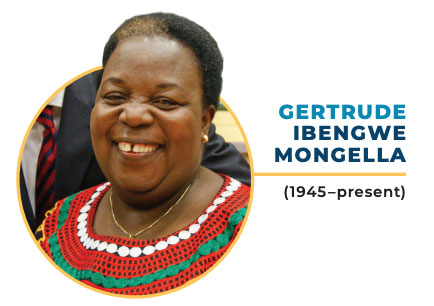
Gertrude Ibengwe Mongella is truly a phenomenal woman — she is an educator, a defender of women’s rights, a politician and a diplomat. Born in September 1945 on a small island in Lake Victoria, Mwanza in Tanzania, she has spent her life advocating for women and for her country.
Read More
After graduating from the University of East Africa in 1970, she worked in education for years, as a tutor, a curriculum developer and a school inspector. From 1977 to 1992, she served as a member of the Central Committee and National Executive Committee of the CCM party and served on the Board of Directors for the Tanzania Rural Development Bank.
She then segued more fully into politics. In the mid-70s, she served as a member of the East African Legislative Assembly. Throughout the 1980s and into the 1990s, she was a member of Parliament of Tanzania, becoming the minister for various ministries. She was also a member of the East African Legislative Assembly and the first president of the Pan African Parliament.
In 1991, she was appointed Tanzania’s High Commissioner to India. Two years later, she took on the role of diplomat to the UN and led the fourth World Conference on Women 1993–1995. As general secretary and chair, she significantly contributed to the conference’s success and has since been known as “Mama Peking.”
Gertrude is passionate about championing women’s involvement in political leadership and has served on countless boards and committees, including the UN’s International Research and Training Institute for the Advancement of Women. More recently, she became a member of the AU’s African Women’s Committee for Peace and Development.
Ultimately, Gertrude has committed her life to the political integration of Africa, and she is an inspiration to women everywhere
LETICIA MPUYA
Women Development Lead
— Africa Programs

We want to celebrate the incredible women in our projects who had the courage and determination to break the biases in their own communities and families — and create the futures they deserve.
Around the world, women in our projects are breaking barriers — they’re becoming the first women in their family to earn an education, first women to receive training on how to properly raise livestock and market products, first women in their communities to lead cooperatives and businesses, first women to bring their families to a stable financial status — and, for the first time, they truly believe in themselves and their abilities.
And it’s all because of Heifer supporters like you. Thank you for believing in women and for giving them the opportunity to find their firsts.
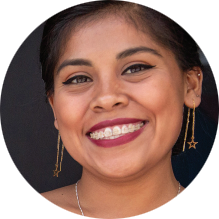 Salon owner Maria Nataly Mendoza Quieju is working hard to challenge the stereotype that women in Guatemala can’t earn their own income. Nataly started working from her home as a stylist in 2016, but she wasn’t making enough. She needed business training and support. In 2018, Nataly partnered with Heifer Guatemala and the Sirolli Institute to receive just that. Through the project, Nataly and her entrepreneurial peers are transforming their ventures into sustainable businesses that benefit their communities.
Salon owner Maria Nataly Mendoza Quieju is working hard to challenge the stereotype that women in Guatemala can’t earn their own income. Nataly started working from her home as a stylist in 2016, but she wasn’t making enough. She needed business training and support. In 2018, Nataly partnered with Heifer Guatemala and the Sirolli Institute to receive just that. Through the project, Nataly and her entrepreneurial peers are transforming their ventures into sustainable businesses that benefit their communities.
![]() The reason I started this business was to change the paradigm that women can’t work.
The reason I started this business was to change the paradigm that women can’t work.
— MARIA NATALY MENDOZA QUIEJU, Guatemala
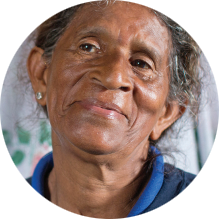 Estefania Cotera Chasin lives in a village set between the ocean and hills in Ecuador. Mother of 12, grandmother of 28, great-grandmother of 16, Estefania is also a businesswoman. Estefania’s children were young when she noticed the shellfish she depended on for her only source of income were starting to dwindle, and she knew it was time to diversify. She started putting money aside for a different future. She began buying acreage where she could graze cattle and plant crops, and she now owns almost 15 acres — and a thriving farm. With Heifer’s help, Estefania mapped out a new career that keeps her comfortable and helps provide for her big family.
Estefania Cotera Chasin lives in a village set between the ocean and hills in Ecuador. Mother of 12, grandmother of 28, great-grandmother of 16, Estefania is also a businesswoman. Estefania’s children were young when she noticed the shellfish she depended on for her only source of income were starting to dwindle, and she knew it was time to diversify. She started putting money aside for a different future. She began buying acreage where she could graze cattle and plant crops, and she now owns almost 15 acres — and a thriving farm. With Heifer’s help, Estefania mapped out a new career that keeps her comfortable and helps provide for her big family.
![]() I’m taking advantage of what I’ve been given.
I’m taking advantage of what I’ve been given.
— ESTEFANIA COTERA CHASIN, Ecuador

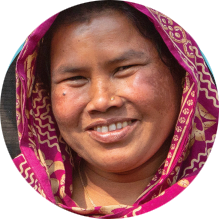 Aeysha Siddka is determined to provide her daughter Amina Akter a better life than she had. Aeysha’s parents arranged her marriage when she was 22 years old. She suffered years of domestic abuse — toward herself and her daughter, who she had four years into the marriage. Violence against women is common, yet divorced women are often ostracized and blamed. So Aeysha chose to stay. She finally realized she would never be safe and left with Amina. After leaving, Aeysha worked menial jobs until she joined a Heifer project in 2013. Here, she learned about animal and crop management and received seeds to start a garden, along with a loan to buy chickens and later a cow. Now that she is a successful farmer and businesswoman, her status has changed. Instead of being shunned and avoided, Aeysha is admired, even sought out. And she wants to help other women achieve this same status — she now serves as the vice president for a cooperative that helps women escape domestic violence.
Aeysha Siddka is determined to provide her daughter Amina Akter a better life than she had. Aeysha’s parents arranged her marriage when she was 22 years old. She suffered years of domestic abuse — toward herself and her daughter, who she had four years into the marriage. Violence against women is common, yet divorced women are often ostracized and blamed. So Aeysha chose to stay. She finally realized she would never be safe and left with Amina. After leaving, Aeysha worked menial jobs until she joined a Heifer project in 2013. Here, she learned about animal and crop management and received seeds to start a garden, along with a loan to buy chickens and later a cow. Now that she is a successful farmer and businesswoman, her status has changed. Instead of being shunned and avoided, Aeysha is admired, even sought out. And she wants to help other women achieve this same status — she now serves as the vice president for a cooperative that helps women escape domestic violence.
![]() I am happy. I have everything I want. Everything I have comes from Heifer income.
I am happy. I have everything I want. Everything I have comes from Heifer income.
— AEYSHA SIDDKA, Bangladesh
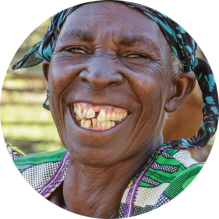 Audrey Mwaba is a joyful great-grandmother, despite having buried seven of her 13 children in her lifetime. Despite her age, she still provides for her children, grandchildren and great-grandchildren, including her two great-granddaughters Emmy and Prudence. As a small-scale farmer, Audrey always struggled to provide the basics. But the family is now thriving thanks to Audrey’s new goat-raising enterprise. Before the new business, the family raised chickens, but lost most of them to disease. They relied on friends to supply them with vegetables in exchange for their labor. After Heifer gave them four female and one male goat, things quickly improved. The five goats have turned into 13, everyone is eating well, and business is good. With the new source of money, Audrey replaced their thatched roof with iron sheets, paid secondary school fees for her granddaughter Rose, and can afford to feed the whole family healthy meals. With better nutrition at home, Emmy and Prudence are now excelling at school.
Audrey Mwaba is a joyful great-grandmother, despite having buried seven of her 13 children in her lifetime. Despite her age, she still provides for her children, grandchildren and great-grandchildren, including her two great-granddaughters Emmy and Prudence. As a small-scale farmer, Audrey always struggled to provide the basics. But the family is now thriving thanks to Audrey’s new goat-raising enterprise. Before the new business, the family raised chickens, but lost most of them to disease. They relied on friends to supply them with vegetables in exchange for their labor. After Heifer gave them four female and one male goat, things quickly improved. The five goats have turned into 13, everyone is eating well, and business is good. With the new source of money, Audrey replaced their thatched roof with iron sheets, paid secondary school fees for her granddaughter Rose, and can afford to feed the whole family healthy meals. With better nutrition at home, Emmy and Prudence are now excelling at school.
![]() For me, it was a privilege because I knew these goats would help me with my grandchildren.
For me, it was a privilege because I knew these goats would help me with my grandchildren.
— AUDREY MWABA, Zambia
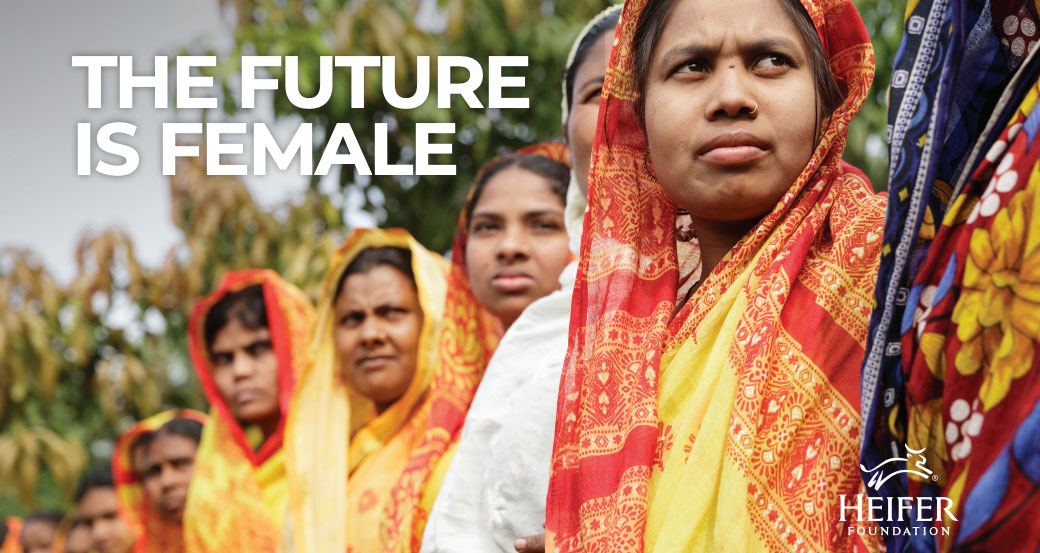
At Heifer, we know women have the power to do anything they set their minds to. But while they have limitless potential, they’re often crippled by limited opportunity. Our projects strive to give women the resources, knowledge and opportunity needed to overcome this. When you set up a donation to Heifer as part of your estate, you create longterm impact that will support women for generations.
For more information, contact Debbie McCullough at 501.907.4922
or Email: Debbie McCullough.
HELP WOMEN UNLOCK
THEIR POTENTIAL WHEN
YOU ADD HEIFER
- to your will or estate plans
- as a beneficiary to your retirement plan assets
- in a charitable trust
- to a donor-advised fund
- to an endowment
BUILD A RESILIENT FUTURE
If we learned anything over the past year, it’s that you never know what the future holds. However, having a plan in place makes you resilient. Now is a great time to establish your plan and help create a better future. And when you set up a donation to Heifer as part of your estate, you create long-term impact that will support and strengthen communities for generations.
Create a better future by adding Heifer…
- to your will or estate plans
- as a beneficiary to your retirement
plan assets - in a charitable trust
- to a donor-advised fund
Request Your Free Guides!
For more information, contact Debbie McCullough at 501.907.4922 or debbie.mccullough@heiferfoundation.org.
